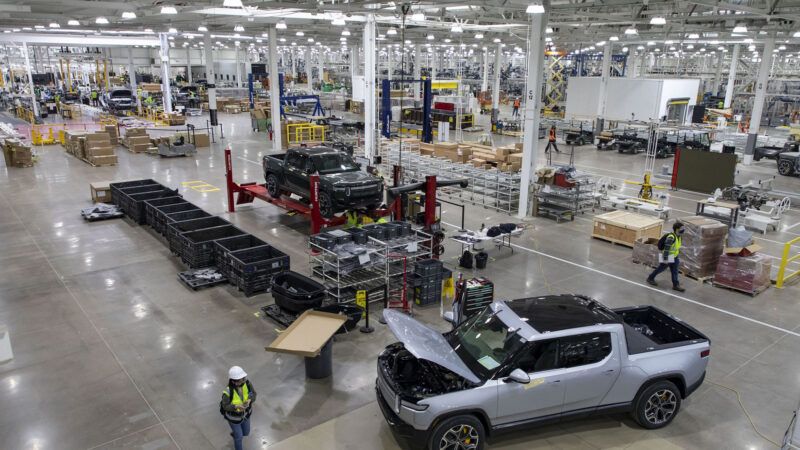Free Market Think Tank Names Georgia Electric Vehicle Plant the 'Worst Economic Development Deal of 2022'
Rivian, an electric truck manufacturer that hopes to compete with Tesla, received a lucrative deal to build a new factory in Georgia despite concerns about its finances.

The Center for Economic Accountability (CEA) is a nonpartisan think tank that opposes corporate welfare. Each December since its founding in 2018, the CEA names the "Worst Economic Development Deal of the Year." And in a year with three times as many projects with billion-dollar state development subsidies as the year before, an electric vehicle (E.V.) factory in Georgia outran the competition.
When two out of every three E.V.s sold in the U.S. is made by Tesla, there is room in the market for competitors. Irvine-based Rivian is one of the most promising, with high-profile investments from Ford and Amazon, including a deal to manufacture 100,000 all-electric Amazon delivery vans by 2030. The company makes luxury all-electric trucks and SUVs from a single factory in Normal, Illinois. To expand its operations, it announced in December 2021 that it would be opening a second factory in northeast Georgia. In exchange, state and local officials, including the Georgia Department of Economic Development (GDEcD), crafted a package of tax credits and state incentives valued at $1.5 billion.
In the report, CEA President John Mozena charged that "bureaucrats and elected officials completely failed in their responsibilities to the state's residents and taxpayers" by approving the deal.
In an interview unrelated to the CEA report, GDEcD general counsel Andrew Capezzuto told Reason that the $1.5 billion is an estimate on the total amount of incentives Rivian will receive over the life of the 25-year lease agreement, tied to specific performance milestones like spending $5 billion on development and creating 7,500 jobs.
Mozena accused the state of making "a massive, speculative investment of taxpayer money in an early-stage company in a highly competitive and government policy-dependent industry." Indeed, since a sky-high initial public offering (IPO) in November 2021 netted the company billions in capital and an $85 billion valuation, Rivian's stock has plummeted, currently trading at less than 20 percent of its price a year ago. While it had over $16 billion in the bank last year, it has lost more than $5 billion in 2022.
Over that same amount of time, several E.V. manufacturers saw similar shortfalls: After becoming only the sixth trillion-dollar company in U.S. history in October 2021, Tesla lost two-thirds of its value in the year since. Lucid Motors, another competitor similar in size to Rivian, lost more than 80 percent of its value in 2022.
Each company is dealing with many of the same problems, including inflation and supply chain tangles that make it difficult to source parts. Over Christmas, Tesla shut down its Shanghai plant due to a COVID-19 outbreak.
The CEA report predicts that based on the volatility of the sector and Rivian's particular challenges, $1.5 billion worth of incentives is a bad bet for a government to encourage the building of a brand new factory. It instead advocates "free-market-based reform of state and local economic development initiatives."


Show Comments (81)